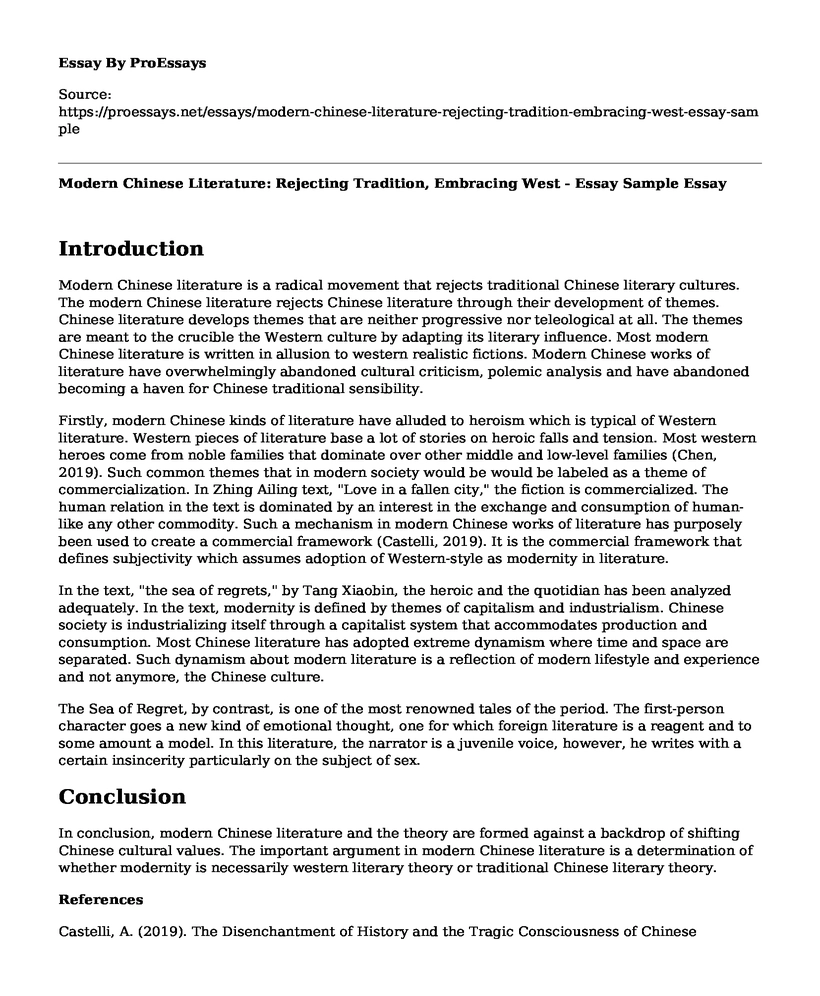Introduction
Modern Chinese literature is a radical movement that rejects traditional Chinese literary cultures. The modern Chinese literature rejects Chinese literature through their development of themes. Chinese literature develops themes that are neither progressive nor teleological at all. The themes are meant to the crucible the Western culture by adapting its literary influence. Most modern Chinese literature is written in allusion to western realistic fictions. Modern Chinese works of literature have overwhelmingly abandoned cultural criticism, polemic analysis and have abandoned becoming a haven for Chinese traditional sensibility.
Firstly, modern Chinese kinds of literature have alluded to heroism which is typical of Western literature. Western pieces of literature base a lot of stories on heroic falls and tension. Most western heroes come from noble families that dominate over other middle and low-level families (Chen, 2019). Such common themes that in modern society would be would be labeled as a theme of commercialization. In Zhing Ailing text, "Love in a fallen city," the fiction is commercialized. The human relation in the text is dominated by an interest in the exchange and consumption of human-like any other commodity. Such a mechanism in modern Chinese works of literature has purposely been used to create a commercial framework (Castelli, 2019). It is the commercial framework that defines subjectivity which assumes adoption of Western-style as modernity in literature.
In the text, "the sea of regrets," by Tang Xiaobin, the heroic and the quotidian has been analyzed adequately. In the text, modernity is defined by themes of capitalism and industrialism. Chinese society is industrializing itself through a capitalist system that accommodates production and consumption. Most Chinese literature has adopted extreme dynamism where time and space are separated. Such dynamism about modern literature is a reflection of modern lifestyle and experience and not anymore, the Chinese culture.
The Sea of Regret, by contrast, is one of the most renowned tales of the period. The first-person character goes a new kind of emotional thought, one for which foreign literature is a reagent and to some amount a model. In this literature, the narrator is a juvenile voice, however, he writes with a certain insincerity particularly on the subject of sex.
Conclusion
In conclusion, modern Chinese literature and the theory are formed against a backdrop of shifting Chinese cultural values. The important argument in modern Chinese literature is a determination of whether modernity is necessarily western literary theory or traditional Chinese literary theory.
References
Castelli, A. (2019). The Disenchantment of History and the Tragic Consciousness of Chinese Postmodernity. CLCWeb: Comparative Literature and Culture, 21(4), 2.
Chen, L. (2019). Wounds of the Past: the Chuanju Performance of Qingtan (Sighing). New Theatre Quarterly, 35(3), 221-237.
Cite this page
Modern Chinese Literature: Rejecting Tradition, Embracing West - Essay Sample. (2023, Mar 04). Retrieved from https://proessays.net/essays/modern-chinese-literature-rejecting-tradition-embracing-west-essay-sample
If you are the original author of this essay and no longer wish to have it published on the ProEssays website, please click below to request its removal:
- Essay Sample: Chinese Food Is One of the Best Food Branch in the World
- U.S. Military Engagement in International Security Essay
- 12 Angry Men: Film Analysis Essay
- Gender and Social Conflicts From the Works of Austin and Dicken Essay
- Essay Sample on Elizabeth Young: Black Frankenstein & Racialization of American Metaphor
- Essay Example on The American Dream: Success Through Hard Work and Sacrifice
- Free Paper Example: The Civil War and Reconstruction







